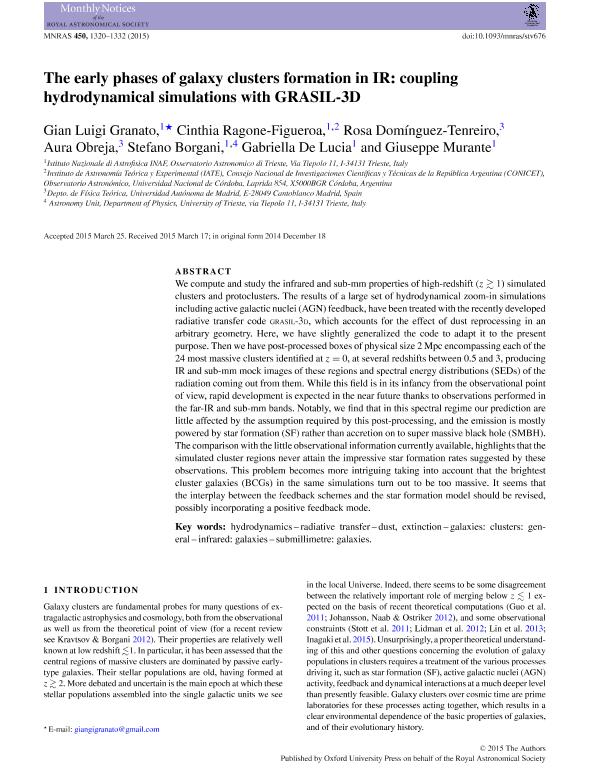Mostrar el registro sencillo del ítem
dc.contributor.author
Granato, Gian Luigi

dc.contributor.author
Ragone Figueroa, Cinthia Judith

dc.contributor.author
Dominguez Tenreiro, Rosa

dc.contributor.author
Obreja, Aura
dc.contributor.author
Borgani, Stefano
dc.contributor.author
De Lucia, Gabriella
dc.contributor.author
Murante, Giuseppe
dc.date.available
2019-02-04T17:34:44Z
dc.date.issued
2015-04
dc.identifier.citation
Granato, Gian Luigi; Ragone Figueroa, Cinthia Judith; Dominguez Tenreiro, Rosa; Obreja, Aura; Borgani, Stefano; et al.; The early phases of galaxy clusters formation in IR: Coupling hydrodynamical simulations with GRASIL-3D; Wiley Blackwell Publishing, Inc; Monthly Notices of the Royal Astronomical Society; 450; 2; 4-2015; 1320-1332
dc.identifier.issn
0035-8711
dc.identifier.uri
http://hdl.handle.net/11336/69297
dc.description.abstract
We compute and study the infrared and sub-mm properties of high-redshift (z ≳ 1) simulated clusters and protoclusters. The results of a large set of hydrodynamical zoom-in simulations including active galactic nuclei (AGN) feedback, have been treated with the recently developed radiative transfer code GRASIL-3D, which accounts for the effect of dust reprocessing in an arbitrary geometry. Here, we have slightly generalized the code to adapt it to the present purpose. Then we have post-processed boxes of physical size 2Mpc encompassing each of the 24 most massive clusters identified at z = 0, at several redshifts between 0.5 and 3, producing IR and sub-mm mock images of these regions and spectral energy distributions (SEDs) of the radiation coming out from them. While this field is in its infancy from the observational point of view, rapid development is expected in the near future thanks to observations performed in the far-IR and sub-mm bands. Notably, we find that in this spectral regime our prediction are little affected by the assumption required by this post-processing, and the emission is mostly powered by star formation (SF) rather than accretion on to super massive black hole (SMBH). The comparison with the little observational information currently available, highlights that the simulated cluster regions never attain the impressive star formation rates suggested by these observations. This problem becomes more intriguing taking into account that the brightest cluster galaxies (BCGs) in the same simulations turn out to be too massive. It seems that the interplay between the feedback schemes and the star formation model should be revised, possibly incorporating a positive feedback mode.
dc.format
application/pdf
dc.language.iso
eng
dc.publisher
Wiley Blackwell Publishing, Inc

dc.rights
info:eu-repo/semantics/openAccess
dc.rights.uri
https://creativecommons.org/licenses/by-nc-sa/2.5/ar/
dc.subject
Dust, Extinction
dc.subject
Galaxies: Clusters: General
dc.subject
Hydrodynamics
dc.subject
Infrared: Galaxies
dc.subject
Radiative Transfer
dc.subject
Submillimetre: Galaxies
dc.subject.classification
Astronomía

dc.subject.classification
Ciencias Físicas

dc.subject.classification
CIENCIAS NATURALES Y EXACTAS

dc.title
The early phases of galaxy clusters formation in IR: Coupling hydrodynamical simulations with GRASIL-3D
dc.type
info:eu-repo/semantics/article
dc.type
info:ar-repo/semantics/artículo
dc.type
info:eu-repo/semantics/publishedVersion
dc.date.updated
2019-02-04T13:09:27Z
dc.journal.volume
450
dc.journal.number
2
dc.journal.pagination
1320-1332
dc.journal.pais
Reino Unido

dc.journal.ciudad
Londres
dc.description.fil
Fil: Granato, Gian Luigi. Istituto Nazionale Di Astrofisica Trieste; Italia
dc.description.fil
Fil: Ragone Figueroa, Cinthia Judith. Consejo Nacional de Investigaciones Científicas y Técnicas. Centro Científico Tecnológico Conicet - Córdoba. Instituto de Astronomía Teórica y Experimental. Universidad Nacional de Córdoba. Observatorio Astronómico de Córdoba. Instituto de Astronomía Teórica y Experimental; Argentina
dc.description.fil
Fil: Dominguez Tenreiro, Rosa. Universidad Autónoma de Madrid; España
dc.description.fil
Fil: Obreja, Aura. Universidad Autónoma de Madrid; España
dc.description.fil
Fil: Borgani, Stefano. Istituto Nazionale di Astrofisica; Italia
dc.description.fil
Fil: De Lucia, Gabriella. Istituto Nazionale Di Astrofisica Trieste; Italia
dc.description.fil
Fil: Murante, Giuseppe. Istituto Nazionale Di Astrofisica Trieste; Italia
dc.journal.title
Monthly Notices of the Royal Astronomical Society

dc.relation.alternativeid
info:eu-repo/semantics/altIdentifier/url/http://adsabs.harvard.edu/abs/2014arXiv1412.6105G
dc.relation.alternativeid
info:eu-repo/semantics/altIdentifier/doi/https://dx.doi.org/10.1093/mnras/stv676
Archivos asociados
